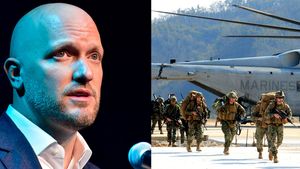In the movie 1985, a 20-something gay New Yorker named Adrian (Cory Michael Smith) travels home to Fort Worth for Christmas to visit his mother (Virginia Madsen), his father (Michael Chiklis), and his younger brother (Aidan Langford). All of them are part of the local church community and none of them know the truth about Adrian's life in the city. Shot entirely in black and white, Tan's film is a requiem for the AIDS crisis, as Adrian's story isn't just about a man hiding his queerness, but a man hiding his illness. Through carefully placed clues, we gather that, tragically, this may well be the last time Adrian sees his family. And that's just part of 1985's overall quietness, which also allows room for its characters -- and subtle period details -- to organically take shape.
Tan, who also directed Pit Stop, drew heavily on past experiences, personal and social, to tell a seasoned tale in a new way, and he spoke with Out about digging up skeletons, the allure of Michael J. Fox, and the challenges he faces because of his own identity.
Out: A movie about the AIDS crisis will never not be relevant, but why make this movie now?
Yen Tan: A lot of it has to do with what was happening when I was making the 2016 short (of the same name). The short film came to me at a time when I was suddenly remembering stories from more than 15 years ago, when I was encountering a lot of people who were living with HIV and AIDS -- people I met in my early 20s. People who survived and people who died. And I don't know what happened to many of them, honestly. But I felt like they shared something with me that, at the time, I intellectually understood it, but, emotionally, I didn't understand the gravity of their situations. Now, after having lived a bit more and gone through more things, I could revisit those conversations and ask more questions that I couldn't before because I was too young.
Out: As in actually ask some of the same people the same questions?
YT: Right. Going back to these people and trying to find out why they made certain choices, or revisiting conversations where I got the sense that a lot of these guys' families had no idea what they were going through, whether it was that they were gay or they had HIV/AIDS. And I can't help but be intrigued by that. Like, how does that work? You might die or you're dying and you can't tell your family? And in today's context, we have a lot of examples of positive coming-out experiences, which has made me wonder if we're at a point where we're actually experiencing a lot of coming-out privilege. Right now, everyone seems more ready for it, and it seems to often turn out well. But back then, you didn't even have the option of coming out to your family. It's always important to look back at what came before us to get us to where we are today. There were a lot of people who paid a big price for us. We shouldn't forget that.
 Out: Were there people you went back to who didn't want to talk about it?
Out: Were there people you went back to who didn't want to talk about it?
YT: I haven't had direct conversations with people who didn't want to talk about it, but I did have people come up to me and say "We don't need a film like this right now. We don't need another LGBTQ narrative that talks about these things again." And I was prepared for that.
Out: Well, people do want to see more positive LGBTQ stories, and fewer tragic ones, but AIDS hasn't suddenly vanished in the age of PrEP, either.
YT: Yeah, and AIDS stigma is still a very real thing. HIV stigma is still a real thing. This whole idea of "Why this film now?" is an interesting question, but at the same time, at all of our screenings, I've had conversations with many different people, and so many parallels have been drawn from the past to the present by the audiences themselves. We don't have to tell anyone anything specific -- they're drawing their own parallels. And it can only be a good thing for people who didn't know much about what happened back then. This can provoke them to look into it or read more about this part of history.
Out: What about your personal history?
YT: I was born and raised in Malaysia, but I've spent most of my American life in Texas -- since 1997, so more than 20 years. But my family is still in Malaysia, a place where police are not actively arresting people for being gay, but it's still illegal. There will never be a Pride parade in Malaysia.
Out: Can you think of a coming-out story of your own?
YT: Yes. I've been asked why I used 1985 as the year, and obviously it's because it was such a dire time for the AIDS crisis, but that year was also the year I discovered I was gay. As a 10-year-old, I had a realization that I was not like everyone else. I was living in Malaysia, and it all had to do with Michael J. Fox.
Out: Michael J. Fox?
YT: Yes. 1985 was the year that Back to the Future came out, and because it did so well, they then put out Teen Wolf. I remember seeing this PG version of Michael J. Fox in Back to the Future and then having this intense crush on him watching Teen Wolf, where he's hooking up with all these girls. It went from that man-crush to I have sexual feelings for Michael J. Fox in Teen Wolf. He started it, basically. Yet, at the same time, that was the year Rock Hudson made the headlines for having AIDS.
 Out: Can you describe any personal state you were in when you made 1985 and how that may have added to its emotional weight?
Out: Can you describe any personal state you were in when you made 1985 and how that may have added to its emotional weight?
Yen Tan: Me and my [professional] partner Hutch made the short film, and then the feature, at a time when both of us were in a really dark place mentally and creatively. It's not that we were dealing with issues of mortality or anything like that, but instead a very common phase that many artists go through, where you realize that if you want to maintain your integrity, you probably won't get really far in the business. We know a lot of people who get far because they're willing to compromise themselves, and it can feel demoralizing, like we're losing friends. It's very ambiguous. But whenever I run into these situations, I feel like Oh, this is the time to create art, to work it out. And it's two different things. Clearly, the stuff our characters are going through here is much harder than what we're going through. But the overall word that comes up for me is "oppression."
Out: Explain that to me.
YT: Well, I'm definitely experiencing oppression, and that's also true for Adrian in the film. Part of my professional oppression involves me being an Asian-American. And it's not just me experiencing it. For instance, one of the things we ran into was a point where we were nearly forced to change Jamie Chung's character, Carly, from Korean-American to white, just because it would help us financially to put another white actor on the roster. Three agencies sent us lists of white actresses and some of them were really top caliber people. At the end of the day, I had to ask myself, as a person of color, What does that mean if I do that and I erase the Asian character? And being an LGBTQ filmmaker on top of all of that makes it even harder.
Out: Is that something you find is getting easier as the industry slowly catches up?
YT: I don't know. There's still always that weird thing that happens where, in certain situations, I feel like it's not the Asian part of me that's hurting me, it's the gay part. And then in other situations, it's not the gay part that's hurting me, it's the Asian part. I've never felt that both things worked in my favor. I've never experienced that. Except maybe when I apply for grants.
 Out: Can you think of a specific time when you knew your identity was working against you, so to speak?
Out: Can you think of a specific time when you knew your identity was working against you, so to speak?
YT: I definitely was in meetings where I was considered for something really big and it's only years later that I became more aware of racial dynamics and microaggression. I then quickly put it together, like, Oh...with all those films, when I was meeting with people and felt like a glass wall came right between us -- that was real. I was not being paranoid. I learn a lot from female filmmakers when they tell me their experiences, because it's like, Oh, shit. I went through the same thing.
Out: How does all of this feed into crafting the story in 1985?
YT: Well, it's as if we used that energy and were like, How do we put all this to more constructive use, and then we put it into a film and channeled it all through that. And that wasn't a surprise for me because my nature is very pessimistic in terms of my worldview, and I see humanity as such that we're just always gonna repeat the same mistakes. But whenever I make a film, I can never put that worldview in because I have too much respect for my characters to not have them be the most realized versions of themselves. So, even if they start off in a bad place, at the end, they've evolved into something better.




 Out: Were there people you went back to who didn't want to talk about it?
Out: Were there people you went back to who didn't want to talk about it? Out: Can you describe any personal state you were in when you made 1985 and how that may have added to its emotional weight?
Out: Can you describe any personal state you were in when you made 1985 and how that may have added to its emotional weight? Out: Can you think of a specific time when you knew your identity was working against you, so to speak?
Out: Can you think of a specific time when you knew your identity was working against you, so to speak?



































































